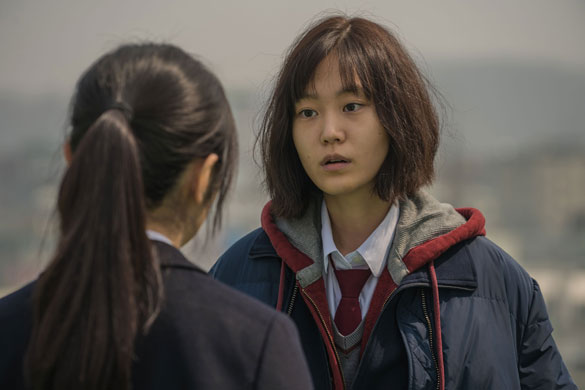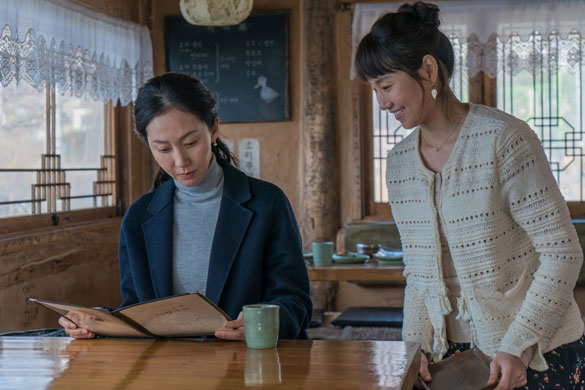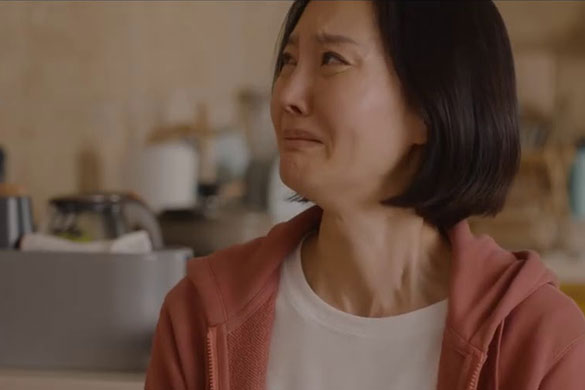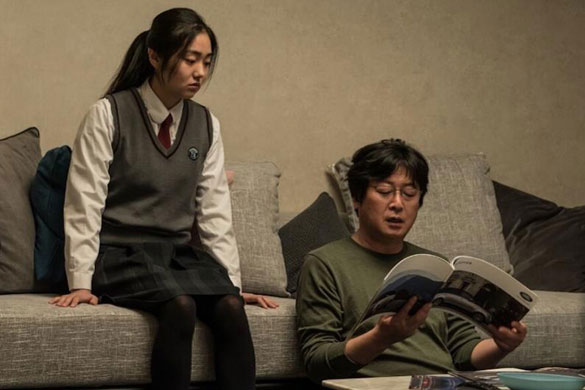"In the name of the Father, the Son and the Holy Spirit, Amen. It's been six months since my last confession...
I hurt a person. It wasn't on purpose, but I pushed a pregnant woman to the ground...
Her child is the result of my husband and the woman's adultery.
I cannot forgive this situation. My daughter is a high school student, and she knows everything...
I am so tired. Those people caused all this, and I wish they were really bad people.
I wish the child was sick, as God's punishment to them..."
Synopsis:
When Joo-ri (Kim Hye-jun) finds out her father is having an extramarital affair she decides to keep the shocking news from her mother, both to spare her feelings and to do what she can to ensure her family stays together. Yoon-ah (Park Se-jin), the daughter of the ‘other woman’ in question, on the other hand couldn’t disagree more, vehemently believing that Joo-ri's mother should be made wholly aware of her husband’s adultery.
During one of many hostile altercations between the two young women, Yoon-ah seizes the opportunity to make that the very case by grabbing Joo-ri’s phone as her mother calls to ‘spill the beans’ in no uncertain terms, revealing that her own mother is now also pregnant by Joo-ri's father.
However, far from clearing the air, Yoon-ah's decision to blow the familial scandal wide open will soon bring wider repercussions than either she or Joo-ri could ever imagine...
Review:
Certainly internationally, actor Kim Yoon-seok is most notably known for starring roles in high-octane, often violent and even explosive commercial blockbusters such as The Chaser, The Yellow Sea, Sea Fog, The Thieves, etc to the extent that Korean film fans in international markets might be somewhat surprised that his directorial debut is a female-centric relationship drama; ultimately gentle in the midst of poignancy and tragedy. However, his filmography is overall so diverse – stretching from, for example, ‘love across time’ themes in timeslip relationship story Will You Be There through to the historically important societal commentary inherent to 1987: When the Day Comes, to comedy/horror elements within exorcism supernatural mystery thriller The Priests and beyond – that film fans in Korea itself would be far less likely to pre-empt an announcement of the film’s subject matter with a guess, educated or otherwise, on what genre would be at the narrative’s core.
Whether the storyline of Another Child was chosen specifically because Kim Yoon-seok felt a character-focused screenplay (co-written by him and Lee Bo-ram) and narrative would more easily show directorial skill in depicting emotional realism equal to that he has repeatedly shown throughout his acting career than anything more pulse-pounding might; as a result of a societal drama being less budget-needy than set piece action laden tales; because female-led relationship stories have been increasingly well received over the years, even becoming pretty much a force to be reckoned with of late; or all of the above, in part at least, is something only Kim Yoon-seok himself could say, but one thing is for sure:
With the story of Another Child he clearly had a lot to say about dysfunction and parental inadequacy within familial relationships, whether overt and noticeable from even a casual look or bubbling below the surface of seeming normality. Kim Yoon-seok deftly expresses these ideas with what could be described as character studies of the parents and children of each family, each sitting perfectly naturally and indeed expanding realistically within the progression of the narrative overall:
 |
In the case of Joo-ri’s family, initially all appears fairly normal in a familial sense but even the tiniest of moments speak of all perhaps not being as perfect as a cursory glance would imply, not least Joo-ri’s father, Dae-won (Kim Yoon-seok), having slept in a separate room from his wife for the past two years. Factor in the adultery Joo-ri's already wholly aware of (unbeknownst to Dae-won) and we see a man whose entire demeanour early in proceedings positively screams of him being clearly, wholly and happily at ease with the belief his sexual misdeeds will never be uncovered (obviously this perception of him could only come with our knowledge of his adultery – if we were unaware, he would again appear as a perfectly normal, if unremarkable, father and husband).
In short, here we have an absolutely self-serving individual coasting along at the emotional expense of those closest to him, even if they have yet to realise it. Once he receives a text message stating “The world knows about your adultery”, Dae-won’s utter self-absorption (again regardless of the wants and needs of his family) comes further to the fore and we see the man he really is – an absolute coward all too ready to whine, feign forgiveness-begging, and run away to avoid confrontation that would force him to take the blame that should truly be his to bear.
For example, while at the hospital checking on the health of his mistress, Dae-won receives a call from Joo-ri and tells her he’s in a work meeting, unaware that Joo-ri is also at the hospital and has just seen him on an escalator. When she calls out to him, he realises his mistake, tries to cover his face and run away, continuing to do so outside and through the streets of Seoul regardless of Joo-ri and Yoon-ah following him calling out “dad!” at the top of their lungs – both despicable and cowardly from our perspective, tragic from Joo-ri’s and farcically humorous in terms of his belief that he can actually get away with such a ludicrous attempt.
 |
Yoon-ah’s family set-up is certainly more overtly dysfunctional, with her (essentially single) mother, Mi-hee (Kim So-jin),doting on the unborn baby in her womb, telling it not to grow up to be like Yoon-ah; and her absentee father not even knowing her age - asking her to take out a credit card for him, thinking she’s 18 rather than 15 (Yoon-ah is so taken aback by this that as he hurriedly leaves her company she calls after him “Do you even remember my name? What’s my name?”).
Mi-hee certainly initially comes across as a deeply lonely woman who herself points to how difficult her life has been but while this does for a period allow us to feel for her and at least in part understand how important the love she’s so long sought and finally, seemingly found in Dae-won is to her (juxtaposed, of course, with our awareness of the negative moral implications of her affair) as Mi-hee's character arc progresses our perceptions somewhat twist as self-serving, uncaring traits in her personality increasingly show, frankly equally inadequate in a familial sense to Dae-won’s. Not least, the whole of her time in hospital she never once visits her newly born son (being far more interested in talking on the phone to Dae-won, asking when she’ll be able to see him and wanting him to tell her he still loves her) and when Yoon-ah demands she sort out the birth declaration papers she nonchalantly refuses to by ignoring her, lying down on a hospital sofa saying she needs a nap.
As we increasingly become familiar with Joo-ri and Yoon-ah through their (first) animosity towards each other and their (later) coming together with the common goal of ensuring the wellbeing of the innocent child, the long and short of all the above becomes abundantly clear: That is, that of all the parents and children involved in the aftermath of the adultery only these two young girls have the necessary caring, giving and family focus to be considered worthy of doing what’s best for Dae-won and Min-hee's newborn child.
The question is will they be allowed, take it upon themselves or even be able to try to do for the baby what it’s parents are utterly incapable of?
 |
Another Child’s alternate title in Korea is Underage and in an emotional sense that title refers more accurately to characters other than Joo-ri and Yoon-ah, these two young girls may be physically underage but emotionally they are the most mature of any of their so called adult family members... and that’s a searing statement on familial dysfunction if ever there was one.
As already stated, Another Child is Kim Yoon-seok’s debut feature but it never feels as such in any respect. Gentle pacing both offsets and ultimately accentuates the cutting emotionality present throughout deftly and confidently to the extent anyone not knowing the film’s background and origins could easily assume this is the work of a director with a number of films under his belt.
Kim Yoon-seok has always been known and applauded for his wholly natural, realistic performances, whether in hard-hitting thrillers or indeed quieter dramas. As such, I was both hoping and expecting the same would be the case for a cast working for him as director. That was certainly the case in Another Child and I was frankly absolutely blown away by each and every exemplary, nuanced performance even more than I expected to be, not just from big names like Yum Jung-ah, Kim So-jin, and, of course, Kim Yoon-seok himself but also and equally by younger and lesser known actresses Kim Hye-jun and Park Se-jin in the two lead roles, each making their character their own to the nth degree.
Ultimately, the fact that Another Child is directed by such a popular actor will draw audiences in first and foremost but it is his success in doing so and the exemplary performances on show that ultimately make the film a worthwhile watch. Sure, there’s no denying that Another Child is a simple story but is wholly engaging nonetheless and its understated look at familial dysfunction just below the narrative surface adds a further thought provoking level to proceedings for those who choose to delve a little deeper.
Essentially, Another Child is a present day example of the age-old classic Korean cinema trope warning that voracious sexuality can all too easily be virtually guaranteed to destroy the family unit - always a traditional symbol of cultural and indeed societal stability - and as such Kim Yoon-seok's narrative points deftly to the fact that though tradition has largely given way to modernity over the years some long held perceptions of traditional society values and ideals still remain, as does the seeming unthinking ease with which the selfish can risk the devastation of all-important familial bonds for the sake of self-serving pleasure. Where Another Child brings this classic idea right up to date is in its implication of the young girls' maturity focused on family in contrast to the sheer immaturity of their adulterous parents, reflecting the fairly modern idea that the future is in the hands of, and indeed ultimately belongs to, the young.
Summary:
While Another Child is a fairly simple story, gentle in pacing and physical depiction, its heartfelt emotionality portrayed by an exemplary cast is its true strength throughout, thematically virtually redefining the film’s alternate title Underage in terms of familial dysfunction.
As a final note, you can read the 2012 Hangul Celluloid interview with actor/director Kim Yoon-seok at:
http://www.hangulcelluloid.com/kimyoonsukinterview.html
ANOTHER CHILD (미성년) / 2019 / aka UNDERAGE
Director: Kim Yoon-seok
Starring: Kim Hye-jun, Park Se-jin, Yum Jung-ah, Kim So-jin, Kim Yoon-seok
|





